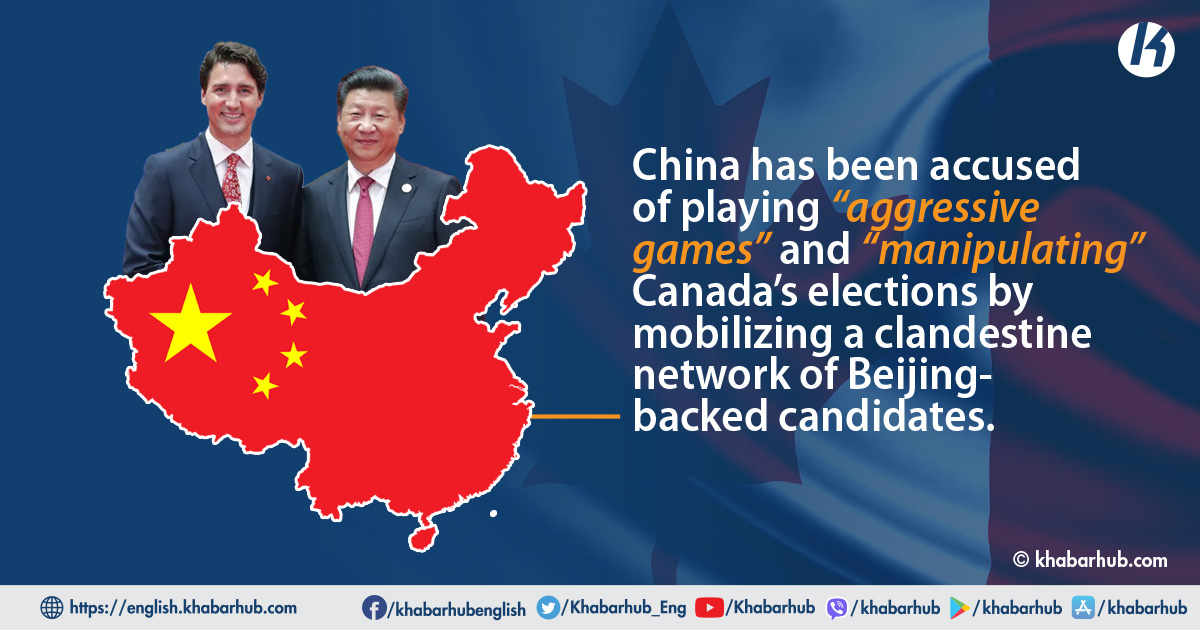China adopted an “aggressive” strategic plan to infiltrate Canadian and Western societies, and manipulate people’s opinions, to make sure that Canada enacted policies that were favorable to China.
Canadian Prime Minister Justin Trudeau, therefore, accused China of trying to interfere and manipulate the country’s elections.
If Trudeau’s statements are to be considered, Beijing tried to play “aggressive games” with democracies besides targeting Canadian institutions.
This came true as Canadian media reported that the country’s intelligence identified what it called a “clandestine network” of Beijing-backed candidates at the last elections.
Canadian official reportedly told PM Trudeau that Beijing supported as many as 11 candidates in the 2019 federal elections directing funds to them, according to the Global News report.
According to the report, in one case, funding of C$250,000 was directed through the office of an Ontario-based provincial MP.
That was not all. Chinese officials made efforts to “co-opt and corrupt” former Canadian officials in a bid to gain influence within the political circles, BBC report said.
What also needs to be considered is that Beijing has adopted an “aggressive foreign policy” as it seeks to expand its economic, political, and military influence around the world.
The efforts — reportedly directed from China’s consulate in Toronto — also sought to place operatives within the offices of serving MPs in an attempt to influence policy, according to the media outlet.
The interference was believed to have targeted Canada’s major political parties, including PM Trudeau’s Liberal Party and the opposition Conservative Party.
It is, however, unclear whether the campaign was successful, BBC said.
Reports suggest that Beijing “deployed” what they called a “sophisticated strategy” to disrupt Canada’s democracy in the 2021 federal election campaign.
According to BBC, Trudeau said at a press conference in November 2022, “We have taken significant measures to strengthen the integrity of our elections processes and our systems, and will continue to invest in the fight against election interference, against foreign interference of our democracies and institutions.”
However, Beijing, on the other hand, denied any meddling in Canadian elections.
China, meanwhile, has also been accused of opening “unofficial police stations” on Canadian soil.
If both allegations are true, there is certainly a need for seriousness because China can succeed in triggering a political and media-feeding frenzy that threatens or create damage to Canadian democracy.
Reports are that Beijing covertly utilized disinformation campaigns and political donations to help elect politicians Beijing favored.
However, Canadian government officials concluded that the outcome of Canada’s 2019 and 2021 national elections was not affected by Chinese meddling as opinion polls showed that most Canadians were concerned about the issue, reports said.
Therefore, Canada needs to be clear-eyed in managing this difficult relationship with Beijing as it needs to continue to safeguard its democratic system as Beijing expands its global influence becoming increasingly assertive.
And obviously, several of those “identified politicians” were of Chinese heritage, and, hence, ethnic Chinese officeholders and public intellectuals were easy targets of suspicion.
For instance, Han Dong, who got elected to Parliament in 2019 representing an area of Toronto, stepped down from the ruling Liberal Party following leaks about his alleged connections with Chinese diplomats.
All these instances have, over the past few years, anti-Chinese sentiment and hate crimes have been on the rise in Canada due to which these countries and China are engaged in trade disputes, among others.
What is to be noted is that Canada’s one greatest strength is that this country “embraces” diversity and differences.
Therefore, in such an environment, China-bashing is resounding around Canada because of which several politicians in Canada have started echoing the groupthink in Washington that defines China as an “existential threat”.
What also needs to be considered is that Beijing has adopted an “aggressive foreign policy” as it seeks to expand its economic, political, and military influence around the world.
Therefore, Canada needs to be clear-eyed in managing this difficult relationship with Beijing as it needs to continue to safeguard its democratic system as Beijing expands its global influence becoming increasingly assertive.
(With inputs from irsem.fr; The Diplomat; npr.org; theglobeandmail; cbc.ca; bbc)









Comment